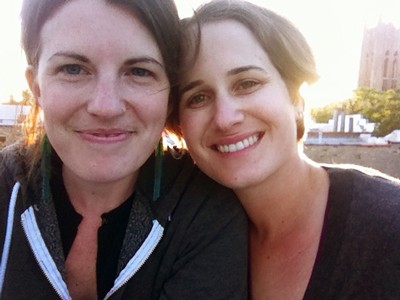by Diana Crandall
In a phone interview Monday, Loyola University Chicago student Christine Irvine explained why her request to host a civil union ceremony through her Catholic university has captured national attention.
Irvine, who is engaged to a woman, approached her university in September to hold a civil union ceremony on her campus.
“We received a flat out no in September,” Irvine said. “We wanted a civil union ceremony. We were looking at event space on the campus in an Arts building, not the chapel.”
In response to this growing controversy, Loyola’s director of communications, Maeve Kiley, sent an email statement in September to Loyola’s student newspaper: “Currently, the university guidelines are that we allow marriages on campus that are recognized by the State of Illinois,” Kiley said. “But the university welcomes all wedding receptions on campus, including same-sex.”
Kiley made this statement before the Illinois House of Representatives passed SB 10 on Nov. 5, legalizing same-sex marriage by a 61-54 vote. Governor Pat Quinn is expected to sign the bill into law by the end of this month. Just two months after denying Irvine and her fiancé, Loyola has begun to rewrite its policy on the ceremonies they will allow at their venues.
Protected under the first amendment, it may seem clear that Loyola, as a private religious institution, has the right to turn away same sex ceremonies; however, wedding ceremonies and receptions are not only common at Loyola, but are marketed to both students and the general public without specifying gender or religious affiliation, apart from their campus chapel, the Madonna della Strada.
On the contrary, the university has ballrooms, halls, and pavilions on multiple campuses in Chicago for any couple to utilize. Moreover, the fact that Loyola receives federal funding from the U.S. Department of Education complicates the university’s protection under the first amendment.
Under the establishment clause, the government cannot endorse any specific religion. According to the financial aid department at Loyola, 96% of 2013 freshman and 89% of 2013 transfer students received financial assistance this autumn (from FAFSA). Loyola also participates in the Federal Work Study program (FSW), which offers on-campus jobs to students based on need.
Therefore, while Loyola remains a Catholic university, if any of its recent renovations to chapel or other venues are funded even in part by federal dollars, the legality of Loyola’s denial of Irvine’s ceremony is convoluted.
Litigation over this is possible, but protection of religious freedom has historically prevailed in the courtroom. This is a particularly sensitive issue amongst Catholics, who were worried that their religious beliefs would be targeted as “hate speech” as society continues to progress on the legal and social treatment of same-sex couples.
In protest of Governor Quinn’s signage of SB 10 into law Wednesday, Roman Catholic Bishop Thomas Paprocki of the Springfield Diocese in Illinois held a public exorcism service to “cast out the work of the devil” and to “cast out the evil” being done.
As Loyola administration and conference services work to reword their policy, they have made it clear that they will not make public comments or engage with the media.
Meanwhile, Irvine has received an outpouring of support from her peers and local community. A petition Irvine created on Change.org has collected over 2800 signatures and is gaining momentum. Major news outlets such as the ‘Huffington Post’ and ‘USA Today’ have picked up her story.
Apart from a letter to the editor that a student wrote to the university newspaper in September, Irvine has not been met with malice.
“I think people are starting to associate me with the petition,” Irvine said, “but I have received nothing but support from peers and professors on this campus.”
dcrandal@capital.edu

